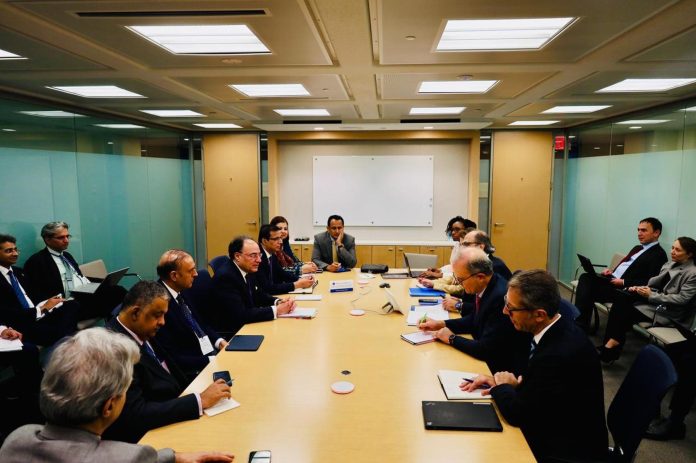
Washington: Pakistan's Federal Minister for Finance and Revenue Senator Muhammad Aurangzeb had a busy first day of his official visit to the United States with a series of high-level meetings on the sidelines of the Annual Meetings of the International Monetary Fund (IMF) and the World Bank Group (WBG) in Washington.
The minister and his delegation had a key meeting with Jihad Azour, Director of the IMF’s Middle East and Central Asia Department, and his team, a news release said.
Both sides exchanged views on Pakistan’s reform agenda and reaffirmed their shared commitment to sustaining the current momentum of reforms, a news release said.
The meeting reviewed progress under the Second Review of the Extended Fund Facility (EFF) and acknowledged the importance of maintaining macroeconomic discipline.
Senator Aurangzeb also attended the Commonwealth Finance Ministers’ Meeting where he underscored the importance of prioritizing concrete actions to advance a resilient and prosperous Commonwealth.
He voiced support for the operationalisation of the Commonwealth Infrastructure and Financial Resilience Hub, as well as the Technical Assistance Fund for peer review and capacity building.
The finance minister reiterated the central importance of climate financing for developing countries like Pakistan and emphasized the urgent need to operationalize mechanisms such as the Loss and Damage Fund.
In another meeting, Senator Aurangzeb had extensive engagement with Axel van Trotsenburg, Senior Managing Director of the World Bank Group.
He expressed appreciation for the World Bank’s continued commitment to Pakistan’s national development agenda.
The finance minister reiterated that the climate crisis remains an existential challenge for Pakistan, referencing the devastation caused by recent floods and their severe impact on the agriculture sector and GDP growth.
He emphasized the need for enhanced investment in climate adaptation and mitigation measures and agreed on the importance of mobilizing additional resources to manage future natural calamities.
In addition, the finance minister was hosted by the leadership and members of the US-Pakistan Business Council (USPBC).
He briefed participants on the positive trajectory of Pakistan’s macroeconomic indicators and emphasized that private sector growth is vital to sustaining economic momentum.
Senator Aurangzeb reaffirmed the government’s commitment to addressing business challenges and providing maximum relief.
He highlighted the recent trade deal with the US authorities and expressed optimism for enhanced government-to-government (G2G) and business-to-business (B2B) engagements in key sectors, including mining, agriculture, information technology, and pharmaceuticals.
The session concluded with an interactive Q&A, during which the Minister assured that genuine concerns raised by business leaders would be addressed.
Earlier, the finance minister held a productive meeting with Robert Kaproth, Assistant US Treasury Secretary for International Finance, and Counselor Jonathan Greenstein.
During the discussion, the finance minister highlighted the strong economic fundamentals of Pakistan, underpinned by the ongoing IMF programme.
He welcomed the successful conclusion of negotiations with the US administration leading to a tariff deal and apprised the Treasury officials about Pakistan’s recent legislation to regulate virtual assets.
He further invited US companies to explore investment opportunities in Pakistan’s oil and gas, mineral, agriculture, and information technology sectors.
Continuing his engagements, the finance minister met with Riccardo Puliti, Regional Vice President of the International Finance Corporation (IFC) for the Middle East, Central Asia, Türkiye, Afghanistan, and Pakistan.
He appreciated IFC’s longstanding partnership and its role in scaling up private sector investment through multi-billion-dollar initiatives under the 10-year Country Partnership Framework (CPF).
Both sides agreed to expedite the financial closure of IFC’s flagship Reko Diq project. The finance minister also welcomed the establishment of IFC’s new regional office in Islamabad, which will further strengthen collaboration with Pakistan.
Senator Aurangzeb also held a constructive meeting with Dr Muhammad Sulaiman Al-Jasser, President of the Islamic Development Bank (IsDB).
He expressed gratitude for the Bank’s longstanding support and reviewed the current portfolio of IsDB projects in Pakistan.
He underscored the importance of accelerating project implementation and thanked the Bank for the approval of financing for two sections of the M-6 motorway.
Both sides agreed on the importance of continued cooperation in areas such as Pakistan’s polio eradication efforts and the oil financing facility, as well as the development of a new Country Engagement Framework (CEF) for Pakistan.
During the day, Senator Aurangzeb also met with representatives of Citi Bank, where he acknowledged Citi’s longstanding partnership with Pakistan and appreciated its continued engagement.
The finance minister shared an overview of Pakistan’s stabilising macroeconomic outlook, driven by ongoing structural reforms and validated by international credit rating agencies.
He also highlighted Pakistan’s growing role as a regional hub for digital innovation and financial services, assuring that the Government would give due consideration to Citi’s proposals.
Besides the above meetings, the minister had interaction with US and international media, including interviews with the Associated Press and Reuters.
The finance minister also attended a dinner hosted by Pakistani Ambassador to the United States Rizwan Saeed Sheikh in honour of the Pakistani delegation, joined by diaspora members, community leaders, and U.S. dignitaries. Discussions focused on Pakistan’s economic reforms, investment and growth.
Senator Aurangzeb praised overseas Pakistanis’ contributions and reaffirmed the government’s commitment to engaging them in national development.